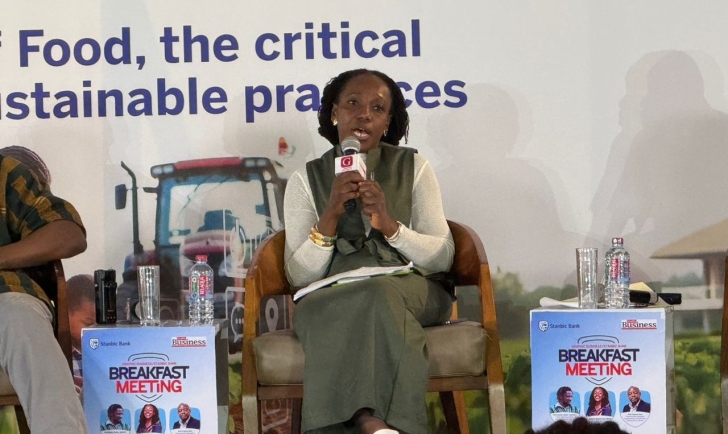The Founder of Agrihouse Foundation, Alberta Nana Akyaa Akosa, has underscored the pivotal role of youth and traditional leaders in advancing Ghana’s agricultural sustainability agenda, calling for structural investments to harness their potential.
Delivering a presentation at the Graphic Business/Stanbic Bank Breakfast Meeting on Tuesday, Madam Akosa said Ghana’s food security can only be secured through decentralised, locally informed, and inclusive approaches that leverage the energy of young people and the authority of traditional leaders.
“We see the youth who keep demonstrating beyond reasonable doubts that if given the platform, mentored, and if they have the right mindset and education on agriculture and its opportunities, they should be able to contribute to the future of food,” she stated.
The breakfast meeting, themed “Future of Food: The Critical Place of Sustainable Practices,” brought together key stakeholders from government, academia, civil society, and the private sector to explore actionable paths to agricultural resilience in Ghana.
According to Madam Akosa, the presence of traditional rulers at the forum was crucial, given their control over communal lands and their influence at the grassroots level.
“Our traditional leaders… are also part of governance. They are basically the heads or leaders within the community. How are governments or partners working with them to ensure there is some level of sustainability?” she asked.
Highlighting the challenge of under-utilised regional potential, she called for a regional value chain development strategy where each area focuses on what it can produce best.
“If we look at each region and what can be produced, then we can look at how we can industrialise it and create jobs,” she said.
She further pointed to education as a missing link in the food security value chain, stressing the need for practical agricultural training and innovation hubs in schools.
“Most schools are not having any demonstration centres… even the land meant for laboratories have been turned into dormitories,” she lamented.
Madam Akosa warned of the dangers of short-term thinking, especially in the context of illegal mining. “All of our farmers are even trading their lands for galamsey… because it gives them immediate returns,” she said, describing it as a major threat to long-term food production.
She criticised the inconsistency in implementing agricultural policies, noting that many programmes collapse with changes in government.
“A government comes with a sound policy… the minute they go, another one comes to abolish it. So there’s no continuity,” she said.
Madam Akosa concluded by urging stronger advocacy, mindset transformation, and leadership discipline to drive lasting solutions in agriculture.
“The issue of sustainability and the future of food is safe in our hands, but what practices, what approaches, what are we doing now, and how can we really advance it?” she asked.
The event, organised by Graphic Communications Group Ltd in partnership with Stanbic Bank Ghana, is part of a quarterly platform to examine pressing issues affecting the economy, particularly in agriculture, finance and development.
